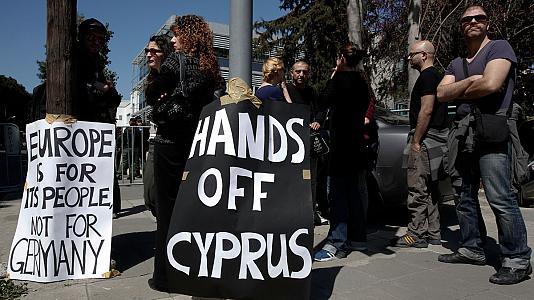By Robert J. Samuelson, Washington Post
Logically, what happens in Cyprus should stay in Cyprus. With a population of just more than 1 million and an economy that’s a mere 0.2 percent of the 17-nation euro zone, the country seems too small to matter on the world stage. Yet, that’s where it is this week — and with good reason: A proposed rescue package for Cyprus’s ailing economy would set a powerful precedent by nullifying government guarantees of bank deposits up to 100,000 euros (about $130,000). The rescue would impose a one-time “tax” of 6.75 percent on deposits under the threshold. Deposits above the ceiling, which aren’t guaranteed, would suffer a 9.9 percent tax.
“Until this [past] weekend, it was assumed that deposits were safe,” says Nicolas Veron of the Peterson Institute for International Economics. “This is a watershed event. We are entering into a new world where deposits are no longer safe.” What Veron and others fear is that, in a future financial crisis, retail depositors — worried that some of their supposedly guaranteed accounts would be confiscated — will stage bank runs, making the crisis worse.
In Cyprus, the government declared a “bank holiday,” shutting banks to prevent massive withdrawals. The country’s parliament then overwhelmingly rejected the original agreement, including a provision that would have exempted the first 20,000 euros ($26,000) from the tax. The fact that deposits remain vulnerable still threatens dangerous side effects: In a new crisis, beleaguered Italy and Spain — the euro zone’s third- and fourth-largest economies — face the added threat of deposit flight.
“A depositor in a weak country with a troubled banking system,” writes Douglas Elliott of the Brookings Institution, “would have to seriously consider moving their funds to a stronger country, which is easy to do within the eurozone, or out of bank deposits altogether [into bonds, stocks or other financial instruments], which is even easier.”
The deposit tax was a concession by Cyprus to receive the rescue package. Rather than abridging the deposit guarantee, Europe’s leaders — working with the International Monetary Fund — could have provided a bigger bailout. The present plan envisions a direct bailout of 10 billion euros, supplemented by about 5.8 billion euros raised from the deposit tax. The European leaders and the IMF could have lent the full amount directly. Considering that bailouts for Greece, Ireland and Portugal have cost hundreds of billions of euros, the extra funds were relatively small.
By this theory, it wasn’t the amount — it was appearances.
In the last two decades, Cyprus has become a major offshore financial center, catering heavily to Russian and Ukrainian business tycoons and companies. In 2011, Cypriot and foreign banks located on the island had assets estimated at eight times the size of the country’s economy (gross domestic product), reports the Institute of International Finance, an industry research group.
In this telling, German Chancellor Angela Merkel, facing an election this fall, felt that politically she couldn’t be seen as protecting Russian fat cats. Taxing deposits forces the Russians and other foreign depositors to bear some costs. Merkel “had to assure [voters] that German taxpayer money would not be effectively used to bail out the Russian oligarchs,” writes Desmond Lachman of the American Enterprise Institute.
One dissent comes from Jacob Kirkegaard of the Peterson Institute. If Europe and the IMF had lent the full amount, Cyprus would have been saddled with an unsustainable debt, he says. The loan would represent about 100 percent of GDP, atop existing debt of 84 percent of GDP. Some funds had to be raised locally, he argues.
Whatever the truth, Cyprus’s banking system needs rescuing. It had invested heavily in Greek government bonds and loans to Greek companies. The bonds were written down, and loan losses mounted. Banks’ capital was depleted.
Cyprus’s economy will get worse before it gets better, says Brookings’s Elliott. It’s already in recession, with 14.7 percent unemployment in January. Banks, a mainstay of the economy, will shrink. Consumers and businesses, having lost sizable deposits, will retrench. But the real question is not about Cyprus. It’s whether what started in Cyprus stays in Cyprus. If it doesn’t, Europe’s prognosis just got a lot worse.



















